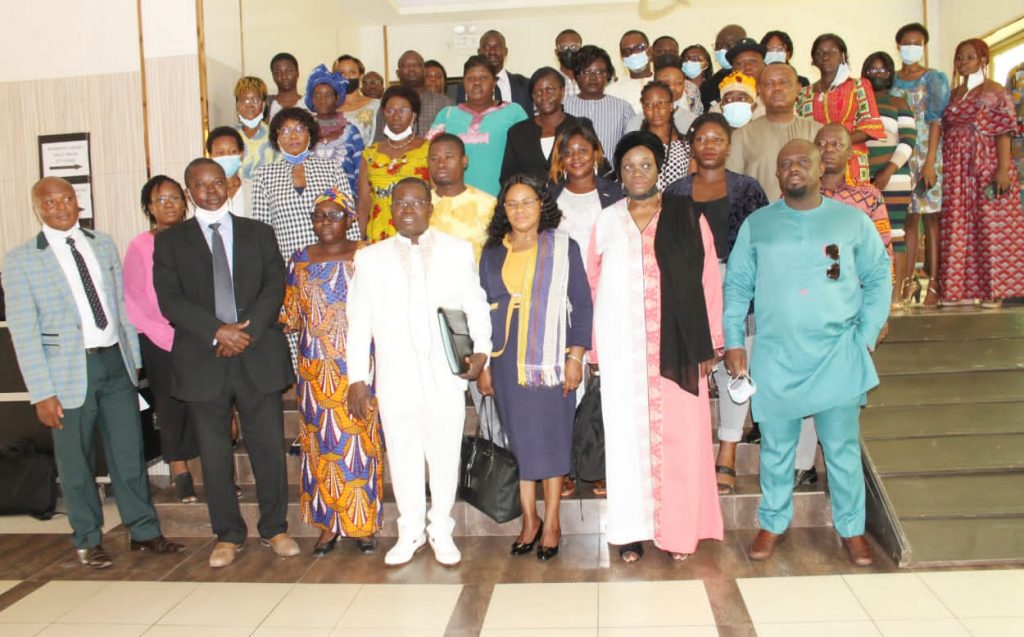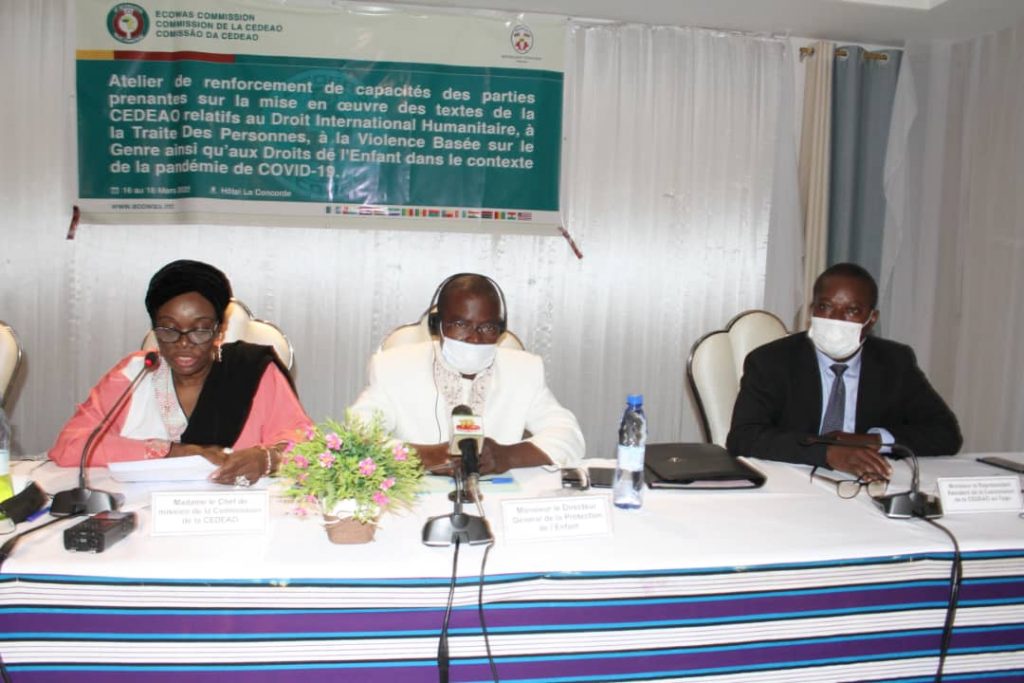Togolese Stakeholders and ECOWAS agree on a roadmap to institutionalise a government and society wide approach towards improving protection and human security
Togolese Stakeholders and ECOWAS agree on a roadmap to institutionalise a government and society wide approach towards improving protection and human security within the context of the covid 19 pandemic in Togo.

Lomé, Togo – March 18, 2022. The Directorate of Humanitarian and Social Affairs in the Department of Social Affairs and Gender organized a 3-day Coordination and Capacity Building workshop for Multi-Stakeholders in Togolese Republic involving Ministries, State Institutions and CSOs (Civil Society Organizations), Private Sector and the Media. The Workshop Component is part of a two-phase Activity in Togo aimed at the development and adoption of a Roadmap; as well as the establishment of an ECOWAS Integrated Protection and Human Security Coordination Mechanism (ECO-PHSICM), hosted at the highest level of Government. The overall purpose of the activity is to strengthen the Protection and Human Security architectures in all ECOWAS Members and Togo is the fifth country to benefit from this intervention. The other countries are The Gambia, Sierra Lone, Burkina Faso and Nigeria.

At the Opening Ceremony, the Director of Humanitarian and Social Affairs, Dr. Sintiki Tarfa Ugbe in her Welcome Address delivered by Hajiya Raheemat Momodu, Head of the Human Security and Civil Society (HSCS) Division welcomed the participants and expressed the appreciation of the ECOWAS Commission of the efforts made by stakeholders to address human security and protection concerns in the country. She informed participants that the 3 Day Workshop Component of the Intervention in Togo should have been preceded by a 2 Day High Level Advocacy with the Prime Minister of the Togolese Republic and other relevant Ministers by the Commissioner, Social Affairs and Gender. And that the High-level Advocacy will still take place in the nearest future. She also informed participants that the Togo intervention was the last of the five countries earmarked in 2021; as eight countries will be covered in 2022.
Hajiya Momodu, noted that the rationale and justification for the intervention is to address prevailing realities in West Africa with regards to Human Security and Protection including Human Trafficking, Violence Against Children, Irregular Migration, Drug Abuse, Gender Based Violence, Low Level of Social Protection and Access to Justice, Forced Displacement amongst others. According to her, the main expected outcome of the intervention, is substantial improvement in national coordination and capacity to prevent and address vulnerabilities, victimization, and other related risks; hoping that the Rights of Children, Women and other groups in vulnerable situations are mainstreamed into National Development
Planning, Budgeting Process, and adequate resources allocated with resultant significant improvement in citizens’ protection and human security.
Other speakers at the Opening Ceremony include the ECOWAS Resident Representative in Togo, H.E. Barros Bacar Banjai, represented by Mr. Raoul Honvo; and the Minister for Social Action, the Promotion of Women and Literacy, represented by the Director General of Child Protection in the Ministry, Dr. Kondoh Kandale. A Goodwill Message was received from a Representative of Civil Society Coalition in Togo, Madam Zewu Afiavi Akpene. All the Speakers reiterated the commitment of the Government and People of the Togolese Republic towards the enthronement of protection and human security in Togo in particular and the region in general. The Opening Ceremony was moderated by Mr. Babimlé Lagnie of the ECOWAS National Office in the Togolese Ministry of Economy and Finance.
The Workshop ended with the adoption of a Roadmap and an agreement of the Togolese stakeholders on the establishment of the Togolese Protection and Human Security Coordination Mechanism in the country with membership from all relevant stakeholders. The stakeholders also agreed on key Advocacy Points for the second phase of the Activity. Some of the recommendations made to facilitate the work of all stakeholders in driving the protection and human security agenda in the country, include: establishment of a system that guarantees prompt and affordable access to justice by the most vulnerable in society; creation of an enabling environment for the protection of vulnerable people, especially women and children by the abolition of harmful social norms and behaviours; promotion of skill acquisition and entrepreneurship training to ensure that people in vulnerable situations are able to be self-employed or secure employment either in the public and private sector; conduct of a national baseline and situation assessment and analysis, building on existing national surveys on the state of protection and human security in Togo, amongst other recommendations.
In closing, the ECOWAS Commission reiterated its commitment in supporting the Government and People of Togo and indeed other Member States in improving the protection and human security for all ECOWAS citizens and for all persons within the region.
The workshop was very well attended and participants included ECOWAS Staff, ECOWAS National Office, Togo; Office of the ECOWAS Resident Representative in Togo; Togolese Ministries and State Institutions including: Social Action, the Promotion of Women and Literacy, Economy and Finance, Development Planning and Cooperation, Communication and Media, National Children Advisory Council, Human Rights, National Police/Juvenile Brigade, National Assembly Cabinet, Foreign Affairs, National Police/ DCPJ, Togolese Gendarmerie, The Economist of Togo, Ombudsman of the Republic, National Refugee Assistance Coordinator, CNLTP/MASPFA/DGPE, Network for the Fight against Child Trafficking in Togo, many Civil Society Organizations including, Muslim Union Togo, Christian Union Togo, CNSC-TOGO, COSCREMA/ILDA and Media Institutions including the Journaliste Togo Breaking News and MEDIA Togo Main. Partner Organizations in participation were Plan International and ICRC.



